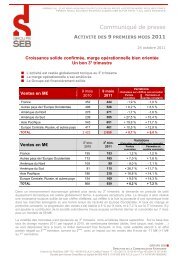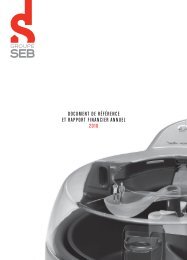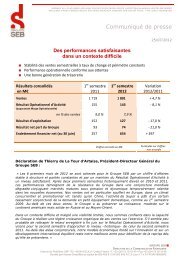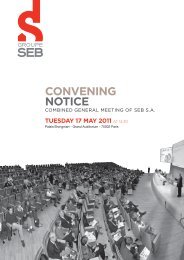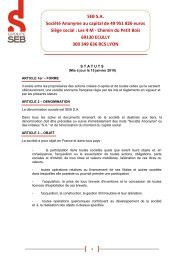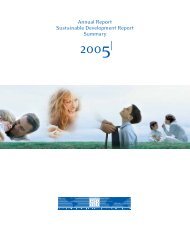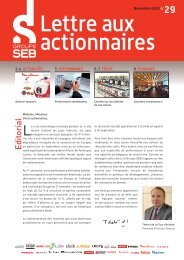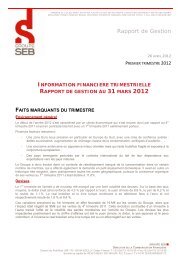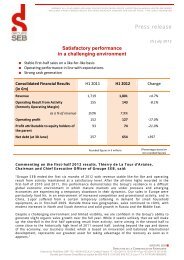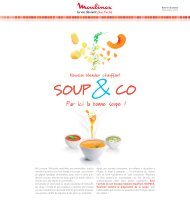financial report and registration document 2011 - Groupe SEB
financial report and registration document 2011 - Groupe SEB
financial report and registration document 2011 - Groupe SEB
Create successful ePaper yourself
Turn your PDF publications into a flip-book with our unique Google optimized e-Paper software.
policy (monitored by a Steering Committee) are put in place to ensure that<br />
systems are fully reliable, secure <strong>and</strong> accessible. Regular investments are<br />
made to improve the Business Continuity Plan in case of a major disaster<br />
on the primary IT processing centre. Anti-hacking audits are carried out<br />
each year to identify any security loopholes in the Group’s network. Lastly,<br />
the management rules for access rights to systems are audited <strong>and</strong> then<br />
updated on a regular basis.<br />
LABOUR RELATIONS RISKS<br />
<strong>Groupe</strong> <strong>SEB</strong> is constantly adapting its structures, particularly its industrial<br />
base, to ensure that it remains competitive. Despite a responsible approach<br />
to restructuring, plant closures remain a serious <strong>and</strong> disagreeable task<br />
which can affect the quality of relations between management, employees<br />
<strong>and</strong> labour unions, <strong>and</strong> which could have repercussions on the Group’s<br />
operations, performance <strong>and</strong> results.<br />
Over the past few years, <strong>Groupe</strong> <strong>SEB</strong> has carried out several industrial<br />
restructuring plans in France <strong>and</strong> elsewhere, featuring site closures <strong>and</strong><br />
downsizing which led to job losses. These operations have had a disruptive<br />
effect on the Group’s trading activity, but it has endeavoured to complete<br />
them fully in keeping with its ethical values. The Group has put in place<br />
substantial <strong>and</strong> often costly resources to ensure a solution for every employee<br />
concerned: measures such as internal mobility, help with personal projects,<br />
assistance with external re-employment, age-related measures, or long-term<br />
training schemes meant that the vast majority of employees succeeded in<br />
fi nding a solution. In most cases, the Group has also managed to ensure the<br />
re-industrialisation of the employment zones involved by helping to identify<br />
new operators <strong>and</strong> support the set-up of business activities to create jobs<br />
at the sites concerned.<br />
The Group gives high priority to the quality of on-going dialogue with<br />
employee representatives to solve diffi cult labour issues responsibly <strong>and</strong> in<br />
the best possible conditions for everyone.<br />
RISKS RELATING TO ACQUISITIONS<br />
Over the last 40 years, while pursuing its leadership strategy, <strong>Groupe</strong> <strong>SEB</strong><br />
has alternated its development through organic growth <strong>and</strong> acquisitions.<br />
Today, it continues to play a key active role in consolidating the stillfragmented<br />
Small Domestic Equipment sector.<br />
Dependency risks<br />
DEPENDENCE ON SUPPLIERS<br />
As part of its policy of bulk buying, <strong>Groupe</strong> <strong>SEB</strong> relies on an approved<br />
panel of suppliers for production (365 in <strong>2011</strong> versus 330 in 2010), which<br />
accounted for approximately 88% of its worldwide needs last year. Excluding<br />
outsourcing, the top 50 suppliers accounted for 52% of direct production<br />
purchases in value (50% in 2010). With respect to purchases of fi nished<br />
products, <strong>Groupe</strong> <strong>SEB</strong> has drawn up a panel of 50 suppliers who account for<br />
78% of total purchases (73% in 2010); the top 15 suppliers alone accounting<br />
for 68% of the total value of these purchases.<br />
Financial Report <strong>and</strong> Registration Document <strong>2011</strong><br />
1<br />
Presentation of the Group<br />
Risk management<br />
External growth requires an ability to merge new acquisitions effectively <strong>and</strong><br />
generate synergies. With its many acquisitions over the years, <strong>Groupe</strong> <strong>SEB</strong><br />
has built up experience in integrating newly acquired companies. Having<br />
integrated Moulinex-Krups in 2001-2002, it acquired All-Clad in the United<br />
States in 2004, Panex in Brazil <strong>and</strong> Lagostina in Italy in 2005 <strong>and</strong> Mirro<br />
WearEver in the United States in 2006. It went on to take majority control<br />
of the Chinese company Supor at the end of 2007. This latest operation<br />
st<strong>and</strong>s out because of the major challenges it presents: separation both in<br />
terms of distance <strong>and</strong> culture, language barrier, more complex integration,<br />
coordination of communications between two listed companies, harnessing<br />
synergies, etc. Coordinated by a Steering Committee <strong>and</strong> organised into<br />
specific projects involving both Chinese <strong>and</strong> Western employees, the<br />
integration has been carried out under good terms. The technology transfers<br />
<strong>and</strong> synergies identifi ed were implemented, on the whole, by the deadlines<br />
that had been set. In December <strong>2011</strong>, <strong>Groupe</strong> <strong>SEB</strong> acquired an additional<br />
20% stake in Supor, bolstering the initial long-term investment made but<br />
not affecting the effective control or collaboration between <strong>Groupe</strong> <strong>SEB</strong><br />
<strong>and</strong> Supor.<br />
Furthermore, in February <strong>2011</strong> the Group acquired Imusa, a Colombian<br />
cookware company. Integration of Imusa has progressed rapidly, at<br />
an exemplary pace, with strong support from the Group’s pre-existing<br />
subsidiary, <strong>Groupe</strong> <strong>SEB</strong> Colombia. In May <strong>2011</strong>, the Group took control of<br />
a Vietnamese company – Asia Fan – specialising in the production <strong>and</strong> sale<br />
of fans, <strong>and</strong> in December it took control of an Indian company – Maharaja<br />
Whiteline – specialising in small domestic appliances. These companies are<br />
not yet equipped with highly-developed structures or tools that meet the<br />
Group’s st<strong>and</strong>ards in respect of information systems, <strong>report</strong>ing, auditing,<br />
safety <strong>and</strong> security, etc. Because of this, even if the amounts in question are<br />
currently insignifi cant, integration is a key issue <strong>and</strong> a focus of the Group.<br />
Success is never guaranteed from the outset <strong>and</strong> may depend on external<br />
factors, even with every effort <strong>and</strong> the allocation of resources to the<br />
integration process. Regular monitoring of progress on projects <strong>and</strong> of<br />
synergies implemented by an Integration Committee limits the risk of failure<br />
<strong>and</strong> allows the Group to refocus its actions in the event of delays. <strong>Groupe</strong><br />
<strong>SEB</strong> implements this approach consistently to optimise the integration of<br />
recently acquired companies.<br />
On the basis of the <strong>2011</strong> fi gures, the top three production suppliers each<br />
account for 2-3% of the total amount of purchases (3% each in 2010), the top<br />
three suppliers of fi nished products account for around 33% of the total (30%<br />
in 2010), with the largest representing around 23% alone (20% in 2010),<br />
<strong>and</strong> the second <strong>and</strong> third each representing 5% (unchanged from 2010).<br />
Excluding the leading supplier, the low numbers of the next-in-line show<br />
that the Group’s policy of optimising purchasing procedures (in particular<br />
procuring from a smaller number of suppliers) did not result in concentration<br />
of risks. The Group is effectively dependent on external suppliers, where a<br />
late service or delivery or even bankruptcy could be highly prejudicial to its<br />
GROUPE <strong>SEB</strong><br />
1<br />
15



